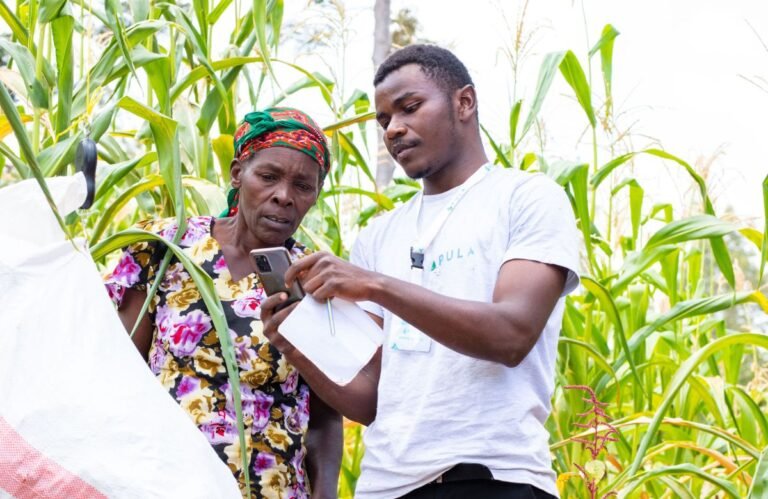
Pula, an insurtech based in Kenya, has since 2015 been keen on enhancing the access to agricultural insurance by small-holder farmers across emerging markets, shielding them against losses from pests, diseases and/or extreme weather events like floods and droughts.
“Partnering with this group of like-minded investors to boost the growth of Pula globally is a very exciting milestone in driving our triple 100 vision, through which we intend to bring insurance to 100 million smallholder farmers.
Pula embeds insurance in partners’ productsInstead of selling insurance directly to farmers, Pula has built a distribution channel of over 100 partners, including charitable organizations, banks, governments and agricultural input companies, to serve even the hard-to-reach farmers, by embedding insurance, for instance, in farm input costs or credit.
Each product Pula offers is customized to suit the demands of its clients, and the needs of the beneficiary farmers.
Pula, through insurance partners, has been offering rural families in Nigeria comprehensive coverage against banditry, disease and death of animals.

Maximize your team’s impact at DisruptWith four conference passes included, ScaleUp Startup Exhibitors can make the most of all three days of the event.
Access to the TechCrunch Disrupt press list.
Upon intent to participate, the ScaleUp Exhibitor Packages are $3,500 and, if your startup is accepted, that fee is non-refundable.
The ScaleUp Startups Exhibitor Program is for Series A to B startups with $35 million or less in funding and costs $3,500 to participate if accepted.
Book your package now to become a ScaleUp Startup Exhibitor at Disrupt and unlock unparalleled opportunities for growth and visibility.

Mobile gadget and bag maker Targus says it is experiencing a “temporary interruption” to its business operations following a cyberattack on Friday.
In a notice with regulators on Monday, Targus’ parent company, B. Riley Financial, said it discovered “a threat actor gained unauthorized access to certain of Targus’ file systems,” and shut down much of its network to isolate the incident.
“The incident has been contained and Targus systems recovery efforts are in process,” the statement said.
B. Riley acquired Targus in a 2022 deal worth approximately $250 million.
When reached by email, a spokesperson for B. Riley did not immediately comment.

The Carevoice, an embedded insurance solution provider that started in Shanghai and now has a footprint across 15 countries, has apparently made that math look attractive to investors in the space.
The company just raised $10 million from a Series B financing led by U.K.-based Apis Insurtech Fund I, which contributed to most of the round.
In 2023, U.S.-based digital health startups raised a total of $10.7 billion across 492 deals, the lowest amount since 2019, according to Rock Health, a health tech-focused seed fund.
That funding slowdown also hit The Carevoice, though it weathered the storm by reaching healthy cash flow.
Embedded health solution providers like The Carevoice can find themselves competing with traditional IT and consulting service companies, such as Tata’s TCS.

French small launch developer Latitude has closed $30 million in new capital as it eyes the first flight of its Zephyr rocket in 2025.
While other rocket companies are going bigger, developing even more massive rockets, Latitude is taking a different approach: light, small, and hopefully cheap enough to beat out competitors.
Its first rocket, Zephyr, will stand at just 62 feet and will be capable of delivering up to 100 kilograms of payload to low Earth orbit.
The two-stage rocket will be powered by eight 3D-printed engines called Navier, which Latitude is developing in-house.
In a statement, Latitude CEO and cofounder Stanislas Maximin said 2024 would be a “pivotal year” before Zephyr’s first flight in 2025.

Torq, a self-described “hyperautomation” cybersecurity startup, today announced that it raised $42 million in an extension to its Series B funding round from investors including Bessemer Venture Partners, GGV Capital, Insight Partners, Greenfield Partners and Evolution Equity Partners.
“Torq’s approach to a hyperautomation platform works across multiple pillars of the organizational cybersecurity platform, making the organization more resilient.”Smadari co-founded Portland, Oregon-based Torq alongside Ofer Smadari, Leonid Belkind and Eldad Livni in 2020.
To that end, Torq lets IT teams create and deploy security workflows designed to integrate with existing cybersecurity infrastructure.
Smadari asserts, however, that Torq gives customers the ability to choose which parts of their data are accessible to the Torq platform and where that data’s stored — e.g.
According to Smadari, Torq, which makes money by charging an annual subscription, has grown revenue 300% in 2023 on 500% client base growth.

Lolli, a bitcoin and cashback rewards application, has raised an $8 million Series B round, TechCrunch has exclusively learned.
Its rewards program awards its users with bitcoin or cashback when they shop online or in person at restaurants and stores.
The app gives up to 30% back on purchases, with an average of 7% back in bitcoin or cashback rewards.
Since its inception, Lolli has given over $10 million in bitcoin rewards, in addition to cashback rewards, Adelman said.
The company plans to use the momentum in the markets to “drive more revenue to partners and bring more major companies into offering bitcoin rewards,” Adelman said.

Qogita – a two-sided ecommerce wholesale marketplace aimed at retailers largely in the health and beauty sectors – has raised €80 million ($86 million) in a Series B round led by London’s Dawn Capital and Accel.
Targeting SME e-commerce retailers businesses that want to deal with a more ‘all-in-one’ wholesale platform, Qogita is not dissimilar to Faire.com in the US (which has raised $1.7 billion to date) and Ankorstore out of France (which has raised €365 million).
In a statement, Norman Fiore, General Partner at Dawn Capital, said: “It is remarkable how complex and completely opaque product procurement still is for small and medium-sized businesses targeting the $6 trillion e-commerce market.
Qogita has built an all-in-one platform to address the entire wholesale procurement process.”Luca Bocchio, Partner at Accel, also added: “The B2B wholesale market in Europe is huge, but also fragmented and complex.
And in April, Ankorstore launched a new membership programme for independent retailers in Europe, removing minimum checkout amounts and waiving heavy/fragile shipping fees, plus a 90 day BNPL offer.











